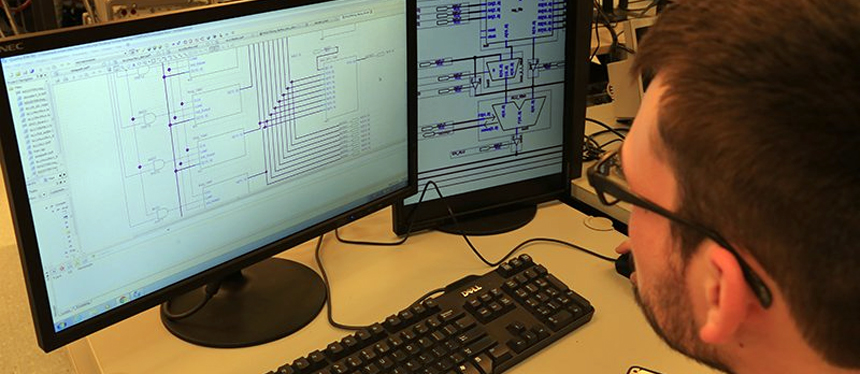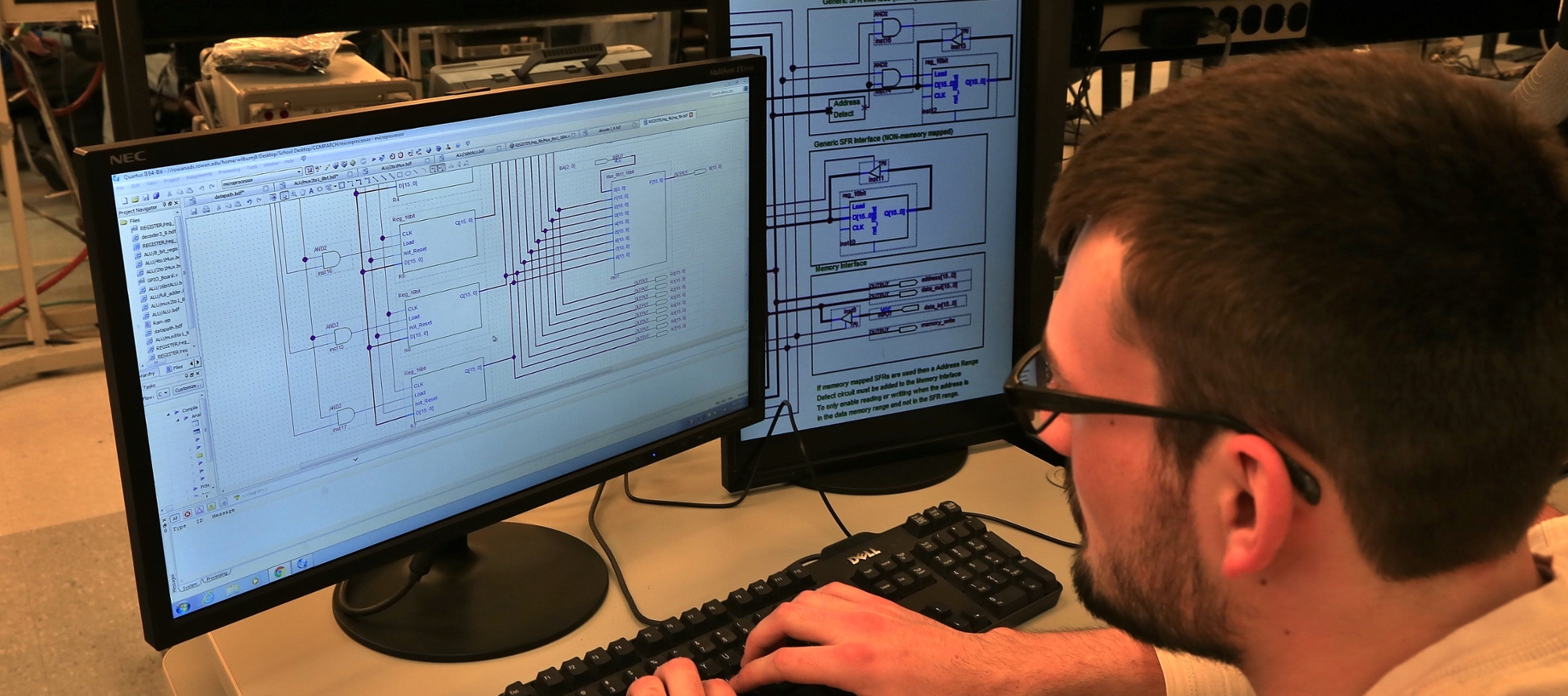PhD Program in ECE
PhD Program in ECE
Ph.D. Program in ECE
Electrical and Computer Engineering Department has a young and growing Ph.D. program. Rowan’s Ph.D. program is a terminal degree program that is specifically designed to meet the changing needs of researchers, scholars, and scientists in academia, industry, and the government. The primary goal of this program is, therefore, to prepare students for careers in research and/or academics by providing an environment that closely reflects the realities and expectations encountered by today’s academicians, professional scientists, and research engineers. The program is designed to offer a highly flexible inter and multi-disciplinary curricular structure, allowing specialization in any (or multiple) of the traditional or emerging engineering disciplines. The primary strength of the program is involving students in activities that they are most likely to encounter in real-world academic or industrial settings.
The new Ph.D. program consists of the following components and degree requirements:
Course Requirements:
A minimum of 72 credits of graduate-level work beyond a bachelor's degree or 42 credits of graduate-level work beyond a Master’s degree in a related field is required. Of these 72 total credits, 42 must come from coursework including at least one approved graduate-level Math class. Certain math-intensive engineering courses may be used to satisfy this requirement (3 credits). The remaining 30 credits must come from "Research."
Up to 30 credits may be transferred from an M.S. degree program (subject to approval), typically 21-course credits and 9 research credits. Students who complete their Master’s degree outside of Rowan University will be considered to have taken 9 credits of ENGR 599. All remaining Research credits must come from ENGR 799 (or ENGR 798), the last of which should be taken during the semester in which the Ph.D. Candidate plans to take his/her Ph.D. Dissertation Defense.
All additional courses to be taken will be determined jointly by the student and his/her Ph.D. advisor (the Advisor) based on the specific area of interest, research, and career goals. Courses offered by one department (under any of the Specializations) will, in general, be available to students in any Specialization, as long as they fit the aforementioned goals.
- Ethical and Responsible Conduct of Research training (including human/animal subject training when applicable):
All Ph.D. students are required to complete all research compliance training required by the University for any research-active employee. To complete the required training, please visit Responsible Conduct of Research (RCR) page and follow the instructions for completing the CITI training. Make sure to complete the RCR for Engineers module. If you are doing any work that involves human subjects (including working on data obtained from human subjects, even if the data were collected elsewhere), you also need to complete the Human Subjects Research Protections module. - Graduate Seminar:
Regular attendance and participation in (0-credit) graduate seminars (ENGR 01.700 What's Next in Engineering: Graduate Seminar) will be required for students for each Fall and Spring semesters they are in the program. This course will be graded on a Pass/Fail basis.
Ph.D. Qualifier Examination
All Ph.D. students need to pass a written Qualifier Exam, which consists of three topics chosen by the student in consultation with his/her Advisor. The topics come primarily from the undergraduate-level courses taught in our program. While the specific topics are subject to change, they currently include the following.
- Probability & Statistics
- Circuits & Electronics
- Digital Systems (Computer Architecture, Embedded Systems)
- Signal Processing
- Electromagnetics
- Control Systems
- Communications Systems
- Machine Learning
- Power Systems
The exam should be taken before the end of the fourth regular semester (not including summers) in the Ph.D. program. Students do not need to wait for four-semester, and may take the Qualifier Exam earlier if they feel they are ready.
You need to score 70% or higher in each of the three topical exams to pass your Qualifier. If you fail any of the three exams in your first attempt, you can choose one of the following two options to replace that exam's score:
- Take an alternate exam on the same topic, one (and only one) more time; you must then pass this exam at this trial, otherwise, you will not have passed the Qualifier;
or - Take an alternate exam in any of the other areas that you have not already attempted; you must then pass this exam at this trial, otherwise, you will not have passed the Qualifier.
For each of the above two options, you should take the alternate exam typically within 6 months – but no later than 12 months – after taking the original exam. Students who do not pass their qualifier exam may not continue with the program.
Career Preparation and Readiness Experience (CPRE)
One of the hallmarks of this new Ph.D. in Engineering program is the Career Preparation and Readiness Experience (CPRE), specifically designed to provide the students with a real-world environment that closely recreates the most important elements of their future career path, regardless of whether that path leads to an academic, industrial or government setting. CPRE consists of four components, each allowing the student to acquire important skills and experience pertinent to typical careers pursued by Ph.D. in engineering degree holders. These components need to be completed before taking the Ph.D. Dissertation Defense:

- Effective Teaching: The candidate will be provided with an opportunity to learn effective teaching. The student will be assigned to a professor to follow in and out of class to learn about the art of teaching, and allow him/her to learn different teaching/learning styles, teaching pedagogy, as well as conflict resolution and responding to a variety of situations that may arise in the course of teaching in a college or corporate setting. During this period, the student may teach the recitation/lab portion of the class, but will not be responsible for preparing lecture material. Once a Ph.D. student is involved in teaching such a lab class, s/he may request primary teaching assignments, appropriate to his/her interests and skills. Each student should ideally teach at least two classes - one at lower and one at the upper level, under the College of Engineering’s Teaching Fellow program. Students interested in an academic career may request additional teaching appointments.
- Grant Writing: The students will be guided by their advisors to learn the art and science of grant proposal writing and application, as well as writing journal and conference papers. The students will then materially participate in their advisor's grant applications, giving them invaluable experience in this exceptionally useful skill. The ECE Department regularly teaches a unique class ENGR 01.702 Strategic Technical Writing and Winning Grant Proposals, which is required for all Ph.D. students in our program.
- Publishing: At least four published conference papers, one published journal paper (beyond MS) and at least one additional journal paper submitted (under review or published) will generally be expected. Depending on the nature of the research or publication venue, this requirement can be modified by the student’s Advising Committee.
- Service: Ph.D. students will be expected to be actively involved in a relevant professional society, and serve on an appropriate department or college level committee. Service involvement will allow the student to broaden his/her understanding and appreciation of different professional expectations, the importance of professional service as well as the role of professional societies in their chosen area of interest.
Ph.D. Advisory Committee
Our Ph.D. program, by its very nature, is designed to be a very flexible program, with very few named course requirements. The specific course requirements, details of Career Preparation and Readiness Experience requirements, as well as the nature of format for all examinations – collectively referred to as the student’s “Program of Study,” will be determined by the student’s Ph.D. Advisory Committee (henceforth the Committee). This committee, consisting of at least 5 members holding Ph.D. degrees, shall have the following composition:
- Student’s Dissertation Advisor. The Advisor’s primary departmental affiliation at Rowan typically becomes the student’s home department. Therefore, in general, your advisor should be a full-time tenured or tenure-track professor in ECE. Under special circumstances, non-ECE faculty may serve as Advisor, subject to Department Head and Graduate Coordinator's approval. For the purposes of choosing an Advisor, a faculty member with a non-ECE primary affiliation, but who has courtesy or secondary appointment in ECE is considered ECE faculty.
- At least 2 additional members from the ECE Department, whose background is suitable to judge the technical merits and soundness of student’s work;
- At least 1 member from outside of the ECE department, who has the appropriate background to provide proper guidance and feedback on the student's work; this person can be from any College at Rowan University;
- At least 1 additional committee member as chosen by the student and Advisor. This committee member should preferably (but not necessarily) be from outside of Rowan - possibly outside of US - who is nationally or internationally known with his/her work that is relevant to the dissertation work. This person may be an industry person or from another academic institution, including those outside of the US.
The first three members of this committee (called, the Core Committee) should ideally be selected during the first 18 months the student is in the program so that the committee can help the student form his/her Program of Study. At least 4 of the faculty members of the committee must be tenured or tenure-track faculty holding the rank of Assistant, Associate, or Full Professor. Faculty joining the committee from outside of United States may have differently named but equivalent titles; e.g., a Lecturer, Senior Lecturer, or a Reader at a U.K. university is eligible. Faculty with research responsibilities are eligible to serve on the Ph.D. Advisory Committee. Faculty with only teaching responsibilities but no research responsibilities, such as those carrying the title of “Lecturer” at Rowan, may join the committee as the fifth committee member (if they hold a Ph.D degree). With the permission of the advisor, the student may invite additional committee members from within or outside of Rowan.
A person who is nationally or interntationally recognized to be knowledgeable about the dissertation topic (such as an industry professional) may serve on the committee even if such a person does not have a Ph.D. degree, but only in the advising capacity and only as an additional member (on top of the five described above). Current Ph.D. students cannot serve on the dissertation committee of another Ph.D. student.
Ph.D. Dissertation Requirements
Please visit the Thesis & Dissertation Requirements page (also available on the Navigation Menu on the left) for information on dissertation format and submission requirements.
